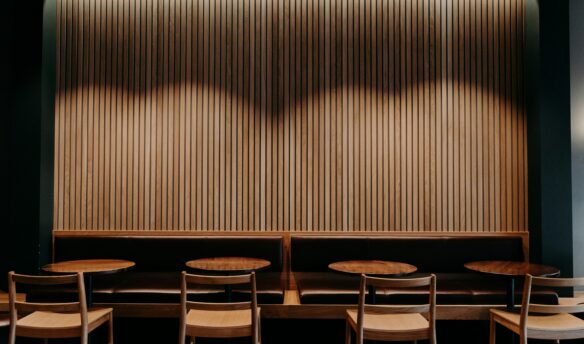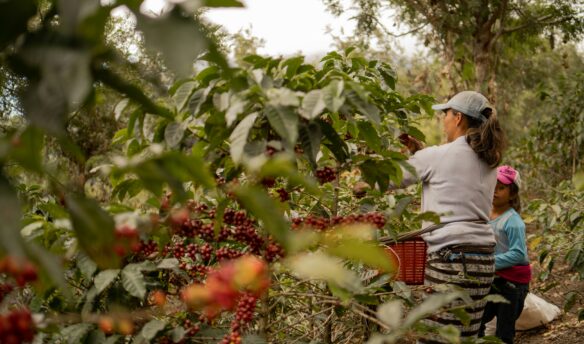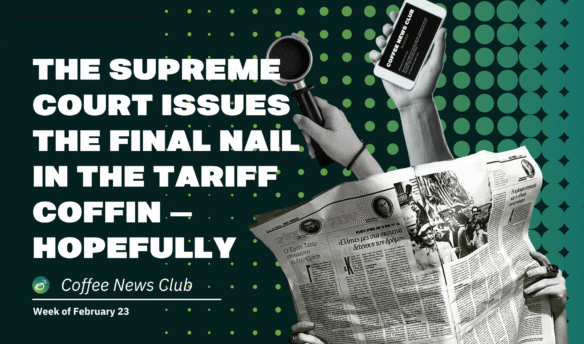Are you a baristcrat? Iron Man thinks you are. Plus, coffee helps the drought-hit Panama Canal, and demystifying green coffee buying with the latest Specialty Coffee Transaction Guide.
‘The 2023 Specialty Coffee Transaction Guide Has Landed’ – via Daily Coffee News
The 2023 version of the annual Specialty Coffee Transaction Guide is out! Compiled by a team of researchers at Emory University’s Goizueta Business School, the guide analyzes and contextualizes over 53,000 green coffee buying contracts from 115 specialty coffee companies around the world. With this data, the guide aims to “provide an alternative for the current reliance on the volatile C-market price for price discovery.”
In publication since 2017, this year’s transaction guide looks at anonymized data from the past three harvest seasons—2022/23, 2021/22, and 2020/21, using free on board (FOB) prices, or the cost of coffees loaded onto a ship at their port of origin. The researchers chose to study FOB prices because they are “consistently reported in most export contracts” and “indicate the amounts of money that stay in the countries where coffees are produced.” However, the authors note that “FOB prices only tell part of the economic story because they do not indicate how much of the contracted revenues make it back to coffee farms.”
Some observations from the guide:
- The median price for green specialty coffee remained relatively stable, falling 3% over those three harvest years, although there were disparities depending on quality. Lower-scored specialty coffees, around 83 points on the Specialty Coffee Association’s 100-point standard, tended to follow the ebbs and flows of the New York C price for commodity coffee, rising in 2021/22 but dipping back in 2022/23. Meanwhile, higher-scored coffees, those in the 87-point range, actually increased in price over the same period.
- Unsurprisingly, smaller lots demand higher prices: the median cost of a microlot of less than 1,000 pounds was more than double that of larger 40,000+ pound lots.
- Coffees from Africa had the highest median price, while Asia had the lowest. However, the authors note that “there was also considerable variability in prices, lot sizes, and quality scores across countries.”
The goal of the guide is to demystify specialty coffee pricing and allow “sellers and buyers to look beyond commodity reference prices.” However, the authors write that the median prices they quote “do not—and should not—represent mandatory, correct, or appropriate prices in any interpretation of these numbers” but “may be useful to contracting parties seeking to understand their market positions and develop value-based pricing strategies.”
As the guide develops and gains more data over the years, the authors hope it will “provide a more robust informational foundation for the independent pricing of the value offered by specialty coffees in ways that support short-term equity and longer-term sector sustainability.”
Read the full story here and download the guide in English and Spanish here.
‘Panama Canal Taps Coffee Farmers to Help Heal Area Hit by Deforestation, Drought’ – via Reuters
The Panama Canal is one of the world’s key shipping routes, with five percent of global maritime trade or around 1,000 ships per month passing through the 50-mile channel. A severe year-long drought is restricting this travel, with authorities cutting the number of boats allowed to use the canal each day by 38%.
The canal’s locks rely on nearby Lake Gatun and another reservoir, but so do more than half of Panama’s 4.3 million inhabitants for fresh water. Despite Panama being one of the wettest countries in the world, a lack of rainfall means Lake Gatun’s water levels have dropped to historic lows, something authorities blame specifically on the El Niño weather phenomenon and, more broadly, climate change. (The fact that canal traffic is dominated by petroleum shipping is a cruel irony.)
As with so many things, coffee might offer a solution. For the past fifteen years, the Panama Canal Authority (ACP) has operated an incentive program to encourage coffee producers to plant trees near the canal and adopt more sustainable farming practices, with one of the key goals to slow deforestation and soil erosion around the canal. Farmers can also access certification programs that help them receive price premiums for their harvests.
“It improves our economy. It helps the climate. We can protect the rivers and it helps the canal better cope with droughts,” Roberto Benitez, from a local producers group, told Reuters about the program.
ACP has spent $32 million on the program since its inception, with 1,700 local producers taking part. Farmers in the Capira region, in the canal’s western basin, produced over 10,000 60-kilogram bags of robusta coffee during the most recent harvest. And it seems like the program is seeing early success: Reuters reports that “experts credit the project with helping to slow the damage to the surface water sources crucial to the functioning of the canal.”
‘Robert Downey Jr. Launches a Joyful New Coffee Company’ – via People
Yes, it’s another celebrity entering the coffee industry, and this one is “a self-described coffee enthusiast,” according to People. Robert Downey Jr., of Iron Man and Ally McBeal fame, has teamed up with entrepreneur Craig Dubitsky to launch Happy Coffee. They aim to “add a jolt of joy to the marketplace.”
The article in People uses lots of marketing buzzwords, such as describing Happy’s “specialty-level blends” that are “made with beans sourced in a traceable manner” and “packaged in futuristic, ergonomically-designed pods.” The brand’s website has a page about the coffees they source, but besides the beans being Rainforest Alliance and Raíz Sustainability verified, there’s not much about where the coffees they buy come from or traceability information.
As noted by Sprudge, Downey Jr. and Dubitsky spend much of their People interview insulting the coffee industry: “It’s just become such a massive industry,” Downey Jr. said, “but we realized you’re either getting stuff that tastes like pencil shavings, or you’re getting the [artisanal] stuff that was passed through the small intestine of a yak.”
The two multimillionaires even coined a fun new term for people who deign to care too much. “We didn’t want to be, we made up this word, baristacrats. We didn’t want to be snobby,” Dubitsky said. “It was important for us to make something that could elevate the every day.”
The brand also “aims to give back,” partnering with the National Alliance on Mental Illness—coffee bags feature a link to the organization’s website. “Coffee sparks conversation,” says Dubitsky. “And loneliness is another big, big epidemic in this country. In some ways, we’re not in the coffee business, we’re in the happy business.”
More News
‘Starbucks Cuts Sales Forecast and Misses Market Expectations Amid Boycotts’ – via Sky News
‘Applications Now Open for Australia’s Richest Barista Competition‘ – via BeanScene
‘EU Deforestation Law Means Uncertainty for African Coffee‘ – via DW
‘New Bill Requires More Kona In Your Kona Coffee‘ – via Sprudge
‘Toronto’s Pilot Coffee Roasters Acquiring Bridgehead Coffee for $3.6 Million‘ – via Daily Coffee News
‘Ethiopia’s Coffee Export Plan Seeks Pricing Power’ – via STiR Coffee & Tea
‘Polarizing Olive Oil-infused Starbucks Drinks Go Nationwide’ – via Salon
‘Americans Are Coffee Obsessed, And Not Just Because Of Caffeine‘ – via Sprudge
The Week in Coffee Unionizing
- Students at two University of California campuses are stepping up their efforts to convince college leadership to cut ties with Starbucks. UC Riverside students presented the administration with a petition containing nearly 800 signatures asking the school not to renew its licensing agreement due to “the actions that Starbucks has taken with its employees across the country,” as one student put it. Meanwhile, students at UCLA attended a board meeting of the Associated Students of UCLA to present their own petition and ask the organization, which controls the college’s dining services, to end its contract with Starbucks.
- Workers at Java Blend, a coffee shop in Halifax, Nova Scotia, say they were fired for unionizing. “We believe our terminations are a direct result of orchestrated retaliation from Java Blend aimed at crushing our workers’ rights,” former employee and organizer Cailen Pygott told CBC. The owners of Java Blend, who also operate three other coffee businesses, claimed the layoffs were due to financial difficulties. The Service Employees International Union Local 2 has filed an unfair labor practice complaint with the Nova Scotia Labour Board on behalf of the nine workers.
Coffee and the Climate Crisis
Coffee production can have a pretty big carbon footprint. However, with thoughtfully implemented techniques and considerations, growing coffee can improve the environment and even sequester carbon in the soil.
Costa Rica already sets the standard as a sustainability trailblazer, generating 99.78% of its power from renewable sources while almost a third of its land is protected. A trio of organizations recently launched a new initiative called Project One to bring that same ambition to coffee production, seeking to help farmers minimize emissions while increasing yields.
Project One is a collaboration between the Costa Rican coffee cooperative COOPEDOTA, Virginia Tech’s Center for Advanced Applied Research (CAIA), and the Tropical Agronomic Research and Higher Education Center (CATIE). The program utilizes “strategic reforestation” and will work with farmers in the Dota, Tarrazú, and León Cortés areas to provide locally-produced organic fertilizer and help switch transportation to electric vehicles to “double [the two organizations’] commitment to air, water, land, and life conservation, becoming pioneers on a global scale,” according to a CATIE press release.
The fertilizer is made from byproducts like wastewater and pulp from coffee processing, combined with fish and phosphorous compounds. “Wastewater from coffee processing has valuable nutrients,” CATIE commercial manager Luis Diego Jiménez told Tico Times. “By combining it with circular economy approaches, we transform waste into organic fertilizer that rapidly strengthens plant growth.”
As part of the project, the COOPEDOTA cooperative will upgrade their trucks to electric vehicles, and fast-growing trees will be planted around participating coffee farms to absorb carbon. The project hopes to be a model for other countries to adopt similar emissions reduction initiatives.






